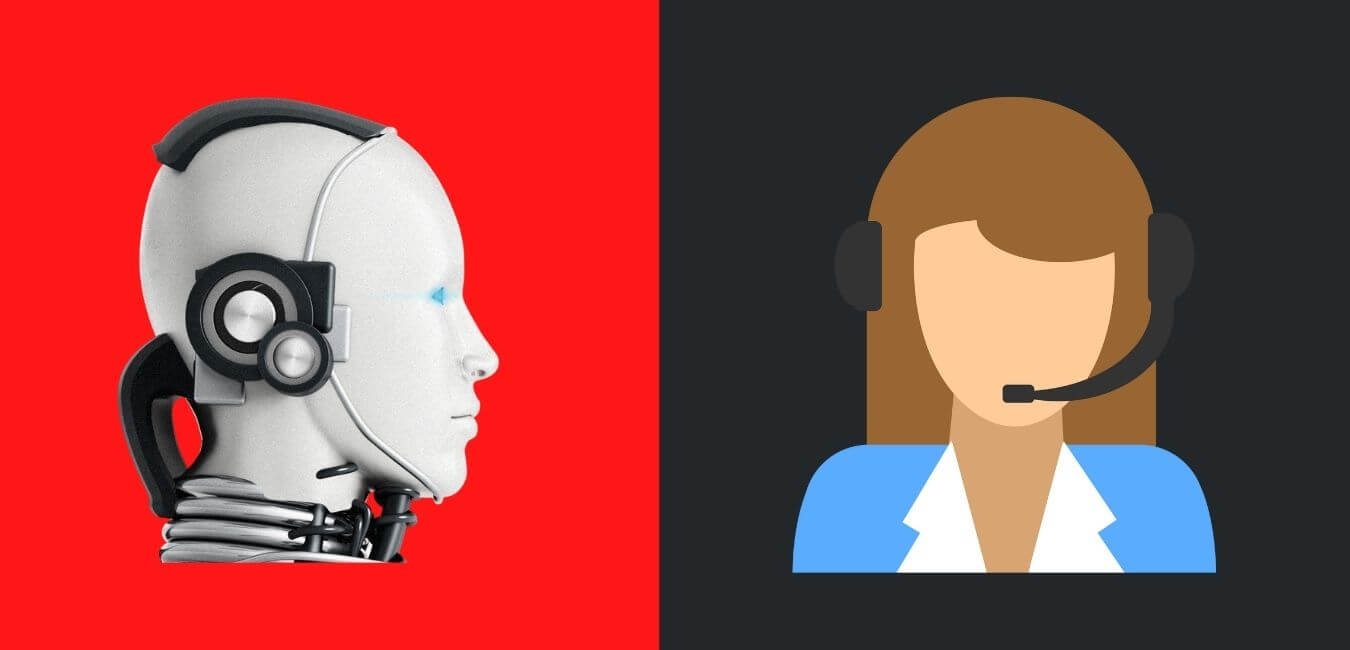Why AI Won't Replace Humans in the Call Center
It's been predicted that artificial intelligence (AI) will soon replace humans in the call center. But is this happening? Is there any truth to these predictions, and what are the implications for call centers?

The answer is no, AI isn't replacing humans in the call center. It may be doing more harm than good by making them less efficient and productive. Artificial intelligence may never fully take over as most companies still need humans on staff to interact with customers during emergencies or if there's something unusual happening at the time of contact. I will be discussing what we can expect from AI in our call centers and why it won't replace humans anytime soon.
What Is Artificial Intelligence
Artificial intelligence (AI) is a term derived from the Latin "artificial" which means "to make something artificial." In this case, it's used to describe machines and computer systems that are made to perform tasks that would be considered intelligent were they performed by humans. It is often shortened to AI.
AI is being used in many different ways. For example, you have probably heard of IBM's Watson computer system which made it big on Jeopardy. Smartphone personal assistants like Siri are another example of AI since they help make basic tasks easier to complete.
Although AI has been around for decades, technology has become more accessible recently thanks to a few factors. One factor is the increasing capacity for computers to process large amounts of data at once, coupled with improving algorithms that make it possible for machines to reproduce human reasoning in a more precise way. Big companies like IBM and Google have invested billions of dollars into research and development, spurring on smaller teams of scientists, engineers, and entrepreneurs to "geek out" on AI. Combine these factors with the altruistic nature of many techies and you get cool things like the Roomba, helpful apps like Waze, and exciting new technologies like autonomous cars.
Reasons Why Ai Won't Replace Call Center Agents
Although these things are all great, they don't translate to the lives of the consumer. AI is still really clunky in real-world situations and it can be costly to re-train employees for different jobs when algorithms become more sophisticated. It's simply too much time and money right now to replace humans with machines in today's customer service workforce.
This is why AI won't replace humans soon. Of course, that's not stopping some companies from trying to jump on the "new technology" bandwagon. I recently read an article about how Amazon is building out what will essentially be a virtual call center made up of chatbots.
I'll admit I was impressed at first with the idea of it. It seemed like a great way to handle many of the simpler questions customers might have. But upon thinking about it more, I'm not sure I see how this is any different than using an FAQ section on your website or creating some kind of knowledge base that customers can reference for solutions to their problems.
I've seen it said that chatbots and virtual assistants like Siri and Cortana will take over the call center industry. There are multiple reasons why I think this is a farfetched idea, but I'll list out some of them:
AI Cannot Replace Humans When you Consider all Customer Touchpoints
Yes, there's no denying chatbots and virtual assistants are becoming more intelligent. They're able to recognize the voice, understand natural language (i.e., not just specific commands), and even anticipate what you might ask them next.
But that kind of functionality is limited to the digital realm; it doesn't translate into customer phone conversations, which still account for a majority of customer-company interactions—even for eCommerce companies.
There's so much more to providing good customer service than just text-based language. It takes empathy, mental agility, and common sense to succeed in an open-ended chat conversation. AIs lack these abilities because they rely on static programming—rules that dictate how the machine will behave or respond in different scenarios— instead of dynamic learning systems or cognitive computing, which are more closely tied to the way humans learn.
AIs are getting better at understanding human language—technology is advancing rapidly. But it's not quite ready for full-fledged customer service applications.
And even if AI becomes sophisticated enough to replace humans in call center jobs, companies may hesitate to do so because of the risks associated with losing touch with their customers.
Customers are Still Going to Expect the Human Touch
If you're talking to Siri or Cortana, they can't give you that warm, fuzzy feeling that comes with interacting with a fellow human being. I've experienced this firsthand when speaking with an automated agent. While some companies use robotic voices because it's easier for machines to talk than humans (imagine Siri reading this entire article), others put personality into their bots because it's more engaging. That's exactly what you want in a customer service representative, so why wouldn't you want to do the same with your chatbot?
Humans are Better at Recognizing Emotion
So far, robots aren't great at understanding our emotions (which is why Siri comes across as so dang sassy sometimes). But this could be one of the greatest strengths of humans working in customer service. While AI can learn to detect frequency and volume changes, there's no way it will ever be able to understand facial expressions like we do (cue "The Emoji Movie"). Even if an automated agent detects that there is negative sentiment in a customer's response, it won't know how to respond unless the system is programmed with a pre-defined list of responses. This means that a human will still need to manually analyze and respond appropriately.
Humans are More Creative
Today, chatbots often rely on question/answer interaction or responses based on sets of rules. Even if they do have a degree of automation, the creativity you see in other areas such as sales and marketing is absent. In customer service, experience and education bring further insights into how to solve problems beyond rote responses.
Humans are Better at Problem-Solving
Unlike an automated system, humans can prioritize and determine which problems are priorities to solve based on a multitude of factors. This is essential in today's always-on world, where customers want answers within minutes because it affects their daily lives or business processes. Decision-making comes into play here as well – how do you decide what to do if multiple problems occur simultaneously?
Many companies are automating aspects of the customer service experience to improve efficiencies, but few are looking to replace their human agents entirely. When it comes down to it, there's simply no replacement for empathy and problem-solving skills that come with an actual human being."
Conclusion
As we've seen, AI is a powerful tool that can be leveraged to improve customer service and increase efficiency. However, it won't replace human beings in the call center anytime soon. The best way for companies to use artificial intelligence right now is as an assistant - not a replacement. This means humans still play an important role in managing tasks like problem-solving and reading between the lines of what customers say on the phone or online chat so machines don't misinterpret their needs and feelings. You may even find your company's most valuable employees become those who are trained up with these skills!



